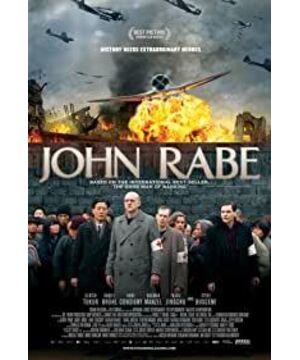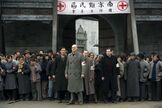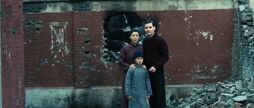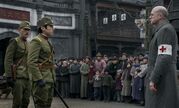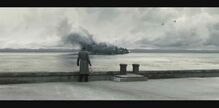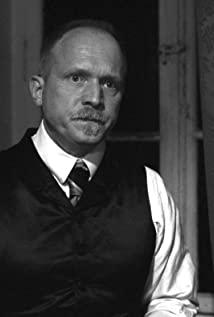The background-like Chinese
When it comes to portraying the real protagonist Chinese in that catastrophe, I cannot fail to mention "Nanjing! Nanjing! ". When the director Lu Chuan received Yang Lan, he said that the close-up of the faces of the Chinese people was based on real photos and tried to find similar-looking extras to play with makeup, and this made "Nanjing! Nanjing! The blank, helpless, but resolute faces in "left a deep impression on me. However, in "Rabe's Diary", director Rory Gallenberg still adopted one of the most mediocre methods to shape the Chinese. Only when Rabe chose the 20 soldiers, the camera gave those soldiers some close-up shots. For most of the time, the Chinese were completely reduced to the props in this film. Except for Zhang Jingchu, the so-called protagonist and Mr. Rabe’s driver, I can hardly remember any unforgettable Chinese face in the movie.
When the Chinese in the film can't impress the audience, the shock of the catastrophe in the film will be greatly discounted. In other words, the core of the story of "Rabe's Diary" is completely transferred to Rabe, so it can even be said that this catastrophe in "Rabe's Diary" has completely become the brilliant image of Rabe in the film. An active background board.
The same problem can also be seen in the massacre. The "Domino Massacre" segment that was heavily rendered in the trailer is one of the most uncomfortable segments I have seen in the film. But this is not because of the cruelty of the massacre, but because of the pretentiousness shown in the bridge section. In the bridge segment, the Chinese soldiers have been completely transformed into props. When the machine gun swept through, there was no intention to evade resistance. They fell in the same posture at a specific time according to the director's intention. Inanimate props are nothing more than that.
While some movies tried to restore every face in that catastrophe, some movies used a rough big brush to paint the Chinese in one stroke. The Chinese in "Rabe's Diary" are all holding the spotlight, but they are all standing behind the spotlight, and all the light falls on Rabe in the movie. Therefore, I have to say that sometimes Bibi knows which film is more sincere.
After
Lu Chuan cut the five-hour movie to two hours, the love triangle plot in the original script was completely deleted, so that we are now in the "Nanjing! Nanjing! In ", there are no emotional entanglements that existed between several characters at all.
It turns out that deletion is more difficult than retention.
It is true that after joining the emotional entanglements of a few protagonists, the film will appear to be more commercial and more attractive to the audience, but it depends on what the film is. Mixing this kind of meaningless emotional drama with a film about the Nanjing Massacre makes people feel bored. Business women don't know the hatred of subjugation, and foreigners don't know the pain of massacre. The catastrophe of the Nanjing Massacre still seems too far away for the blond foreigners. It can be seen from the fact that they completely reduced the Chinese people into props that only breathe. The Chinese bring that kind of indelible pain, but they are looking at the catastrophe with a purely foreign mindset, so they pay more attention to the foreigners in this catastrophe, and they are more concerned about the indispensable occurrence of this catastrophe. Exotics are more interested. This is a natural inertial thinking attitude and even domineering and irresponsible, which makes me doubt the sincerity of Rabe’s Diary. Because the deletion of Zhang Jingchu's love scene in the film has almost no effect on the plot of the film, on the contrary it will make the plot more compact. However, it is this vulgar plot that is useless to show the theme of the film and has nothing to do with history. In the film, it wanders unscrupulously on blood and corpses in the name of "romance on the battlefield".
And the vulgarity in the film is far more than this.
I don't understand whether foreigners can really understand how extravagant it is to have so-called cheers in this catastrophe. The rest of his life is certainly gratifying, but it is far from reaching the level of cheering and joy in the film. This excitement that pulls people back from the death line is more of a kind of sorrow and joy, rather than the heartless carnival in the film. However, this kind of cheer appeared again and again in the film. The most unbearable thing is the last part of Rabe’s departure from Nanjing. Regardless of whether the scene is in line with historical facts, the brightly dressed and blushing extras make it hard for me to feel that they have just left. Experienced a catastrophe that killed countless Chinese people and lacked sufficient food. No matter how many people Rabe saved, any cheers in this catastrophe that killed 300,000 people are harsh. So far, the Chinese in this film has completely become an element that sets off Rabe's brilliant image.
The ending of "Rabe's Diary" is bound to become one of the most vulgar bridges.
No bright spot, mediocre to the end
"No bright spot, mediocre to the end"-these eight words are my most direct impression of "Rabe's Diary". This is a film that has too many flaws, no matter from the respect of historical facts or from the point of view of some fictional plots. This "blockbuster" costing US$20 million has no idea of restoring history, but lacks the ability to restore history or convey the truth. There is a lack of respectful descriptions of the catastrophe, and the negotiations with the Japanese army and the conflicts within the security regiment in the film, which could have been unfolded, have ceased. This mediocre film is not even comparable to Hollywood's standard assembly line works. As for the "Schindler's List", it is a fantasy. Although the actors in the film all have outstanding performances, especially the role of Kagawa Teruyuki who plays Shangmiya Hatohiko is even more respectable. Without these actors, the film would not even be mediocre.
Rabe is great, but this "Diary of Rabe" is too far away from greatness.
View more about John Rabe reviews


